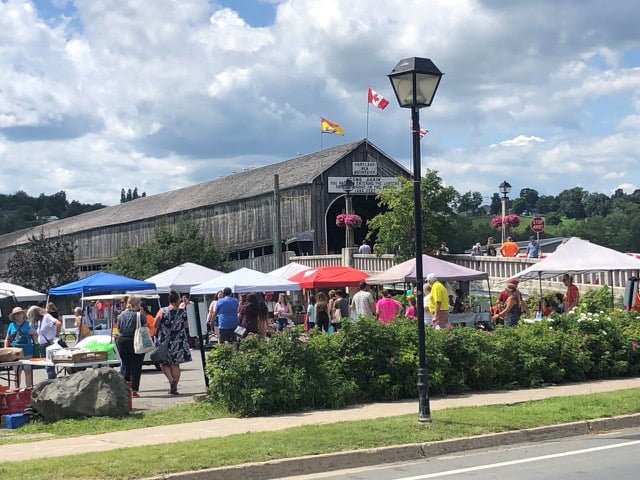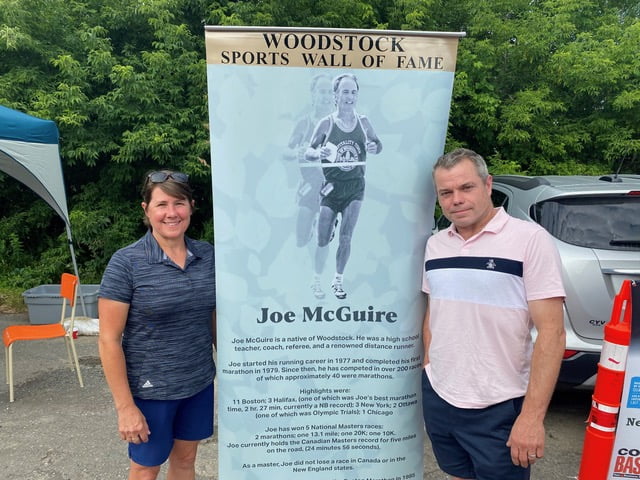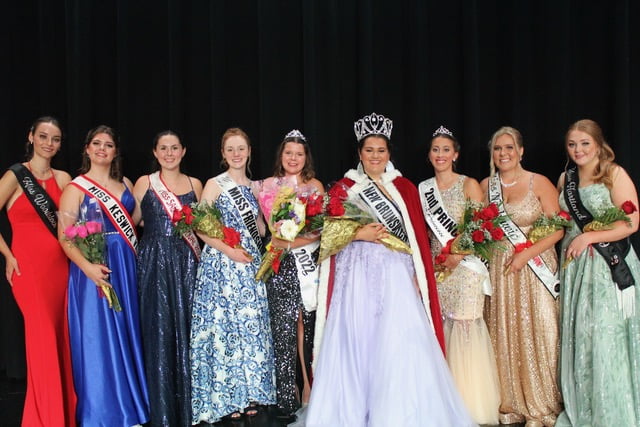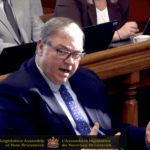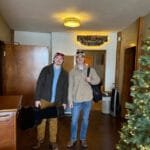Leader Susan Holt and Woodstock-Hartland candidate Marisa Pelkey say, if elected, clinic could open next year
Liberal Leader Susan Holt joined Woodstock-Hartland candidate Marisa Pelkey in Woodstock on Friday morning, Oct. 4, to announce plans to fast-track a community care clinic for the town.
Holt and Pelkey shared the podium at a late-morning press conference at the corner of Deakin Drive and Jones Street, near the building that could potentially house the clinic.
“I’m pleased to commit today to a collaborative care clinic in Woodstock,” said Holt.
She explained that the Woodstock clinic would be part of the platform policy to build 30 such units around the province, which was announced before the election race began.
At the original announcement, Holt identified 10 communities, including Carleton North, in line for the first clinics.
“Marisa came to me right away and said my community needs one of those clinics,” the Liberal leader said. “And then she did the work.”
Holt said Pelkey found a space to hold the clinic, brought together medical professionals ready to offer services in that model and engaged with municipal representatives who wanted to be at the table.
Pelkey said she learned quickly as she began campaigning door-to-door and talking to Woodstock-Hartland voters that healthcare, specifically the lack of a family doctor, was the top concern in the riding.
Holt said candidates hear the same story provincewide. She noted that 180,000 New Brunswickers are without a family doctor, including 33 per cent in the Woodstock region. She added that only 28 per cent of those with a family doctor can get an appointment in less than five days.
Pelkey said that people she talked to in the riding reflected those numbers.
“I’ve heard from people who have been on the waitlist for more than four years,” she said.
Pelkey said the stories motivated her to take action. Over eight weeks, she talked to municipal leaders and healthcare professionals and listened to their recommendations.
She said attempts to establish a clinic in Woodstock date back almost a decade. The steering committee members involved in that effort provided her with important background. She discovered that the people and plans to make it work still exist.
“We have the space. We have healthcare professionals who want to work in this type of collaborative care scene. We have community support,” Pelkey said.
Holt explained that the proposed Woodstock clinic would fall under the previously announced financial framework, noting that it would be added to the 10 communities already named in the plan to build at least 30 collaborative clinics provincially before 2028.
She explained the Woodstock clinic falls under the already-costed program of $11.5 million annually and $150 million across the program.
Because of the work already completed by community members, Holt said the Woodstock clinic could be one of the fastest to complete, suggesting it could accept its first patients before Christmas 2025.
Holt said the Woodstock-Hartland community has been active on the healthcare front, noting the petition with 750 signatures delivered to the province two months ago, demanding action on primary care.
Pelkey and Holt said the steering committee promoting the Woodstock clinic thought it was close to a deal in 2021, but nothing happened.
“We understand the Premier’s been here,” she said. “Mr. Hogan’s been here talking about a clinic for six years. But we haven’t seen anything materialize. Marisa has shown the community is ready to do this.”
The River Valley Sun contacted PC incumbent Bill Hogan for a response on the Liberal announcement in Woodstock. He responded that they would have no comment until Monday, Oct. 7.

He didn’t change his mind when the paper explained that the date was after the River Valley Sun print deadline.
The Woodstock council will host a Woodstock-Hartland candidates forum at the McCain Community Theatre on Monday, Oct. 7, from 7 to 9 p.m.
Holt said the Higgs government has failed to deliver on the collaborative clinics that most healthcare professionals and the community want. She said the community, not the government, must design the model that suits its needs.
Holt said the Woodstock model, designed for the local needs, helps recruit and retain healthcare workers. She noted that Woodstock already has healthcare professionals who want this type of clinic.
“We worry about their retention,” Holt said.
She said new recruits also want this model, which takes administrative efforts off their plate and allows them to enter an established operation.
Holt said the collaborative system allows the community to build a model which meets the medical professional’s needs.
“These solutions are not new. These solutions are not mine. They’re not Mr. Higgs’,” he said.
Holt said her government would act on a solution which has been around for years.
Carleton-Victoria candidate Julian Moulton and Carleton-York candidate Chris Duffie joined Holt and Pelkey at the announcement.
Moulton said the District of Carleton North is ready to proceed with its collaborative care model. At the same time, Southern Victoria, which includes Perth-Andover, has strived for years to restore its dwindling healthcare services.
“Perth has actually been trying to lobby Horizon Health for the last four years to get one of these clinics,” he said.
He said the Southern Victoria council offered to purchase a building and rent it to Horizon Health and even co-fund a clinic but couldn’t get a government commitment.
Moulton said the community watched its ER hours reduced to eight hours a day during COVID and has never returned to 24-hour services.
He said residents in Southern Victoria, Plaster Rock, Tobique First Nations (Negotkuk) and rural areas are on the edge of a primary-care crisis as several doctors near retirement age. He said they also face long drives to Grand Falls or Waterville for emergency care.
Duffie said the Carleton-York riding is primarily rural, with Nackawic-Millville its largest community.
He said Nackawic has an excellent little clinic, but a collaborative model would be a massive improvement.
Duffie said he has talked to Dr. Mary Ann Bramstrup, who works out of the clinic, about the benefits of a collaborative clinic. He explained that she couldn’t meet the community’s healthcare demands.
Duffie said the province must also develop a healthcare model to meet the needs of vast rural areas of Lakeland Ridges and the Keswick area, where residents must travel long distances to access healthcare.



